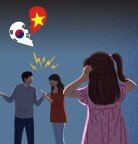Professors involved in the Oxy case and their moral bankruptcy
Professors involved in the Oxy case and their moral bankruptcy
Posted May. 06, 2016 07:23,
Updated May. 06, 2016 08:01
With the on-going investigation into the case of the lethal humidifier disinfectant, the prosecution conducted a search and seize in the research facility and the house of Prof. Cho of Seoul National University and Prof. Yoo of Hoseo University on the charge of manipulating the test reports on the disinfectant and arrested Prof. Cho on charge of bribery. The prosecution is concentrating their investigative resources into finding out if Oxy Reckitt Benckise knew about the lethal nature of polyhexamethylene guanidine (PHMG) and continued to sell disinfectants containing the deadly chemicals starting in 2001. Some experts say that if the company did know about the harmfulness of the chemical, the case could be considered a homicide by willful negligence, going far beyond accidental homicide.
When the Centers for Disease Control and Prevention (CDC) announced the result of an epidemiological investigation in 2011 pointing to the possibility that the disinfectant could be harmful to human bodies, Oxy requested tests to the two professors in 2011 and 2012 to refute the allegation. The test request for Cho was to determine if inhaling PHMG could be harmful to human bodies, and the request for Prof. Yoo was to see if it was possible for PHMG to enter human bodies. The two professors put together the reports indicating that the correlation between PHMG and the dead victims is unclear, and the company submitted the papers to the prosecution and the court, using them when it was negotiating with the victims’ families.
However, it has been revealed that Cho followed an instruction from his client and reduced the maximum exposure level of toxin inhalation from 10 times to 4. As it turned out, Yoo conducted the test at an apartment where an employee of his client was living, failing to keep basic research ethics. Having received 252 million Korean won for his service, Cho is also under the allegation that he had been receiving about 10 million won separately every month with the company demanding that a report must be submitted promptly that will overturn the test results from the CDC.
So far, the number of victims killed by humidifier disinfectants reached 146 (government data), and Oxy Reckitt Benckise is responsible for about 80 percent of those cases. It is shocking that the two professors who gave up their scholarly conscience over money are one of the respected experts in the field of toxins in Korea. If they withheld the knowledge about the lethal quality of the chemicals and manipulated the test, it would make them accomplice to the crime.
Despite the self-rescue measure to make strict research ethics since the scandal surrounding former SNU Professor Hwang Woo-seok in 2005, a similar case has occurred again in the university, which certainly has to bear some responsibility. This writer urges that the special committee proposed by the Minjoo Party of Korea on Thursday should be summoned before the 19th session is closed, and the lawmakers make thorough efforts to find out the responsible parties for the management of lethal materials by the government and the sluggish responses from the prosecution.
When the Centers for Disease Control and Prevention (CDC) announced the result of an epidemiological investigation in 2011 pointing to the possibility that the disinfectant could be harmful to human bodies, Oxy requested tests to the two professors in 2011 and 2012 to refute the allegation. The test request for Cho was to determine if inhaling PHMG could be harmful to human bodies, and the request for Prof. Yoo was to see if it was possible for PHMG to enter human bodies. The two professors put together the reports indicating that the correlation between PHMG and the dead victims is unclear, and the company submitted the papers to the prosecution and the court, using them when it was negotiating with the victims’ families.
However, it has been revealed that Cho followed an instruction from his client and reduced the maximum exposure level of toxin inhalation from 10 times to 4. As it turned out, Yoo conducted the test at an apartment where an employee of his client was living, failing to keep basic research ethics. Having received 252 million Korean won for his service, Cho is also under the allegation that he had been receiving about 10 million won separately every month with the company demanding that a report must be submitted promptly that will overturn the test results from the CDC.
So far, the number of victims killed by humidifier disinfectants reached 146 (government data), and Oxy Reckitt Benckise is responsible for about 80 percent of those cases. It is shocking that the two professors who gave up their scholarly conscience over money are one of the respected experts in the field of toxins in Korea. If they withheld the knowledge about the lethal quality of the chemicals and manipulated the test, it would make them accomplice to the crime.
Despite the self-rescue measure to make strict research ethics since the scandal surrounding former SNU Professor Hwang Woo-seok in 2005, a similar case has occurred again in the university, which certainly has to bear some responsibility. This writer urges that the special committee proposed by the Minjoo Party of Korea on Thursday should be summoned before the 19th session is closed, and the lawmakers make thorough efforts to find out the responsible parties for the management of lethal materials by the government and the sluggish responses from the prosecution.







